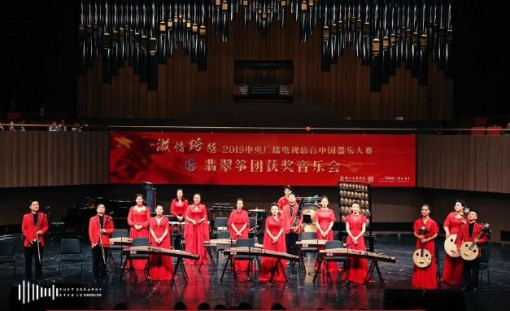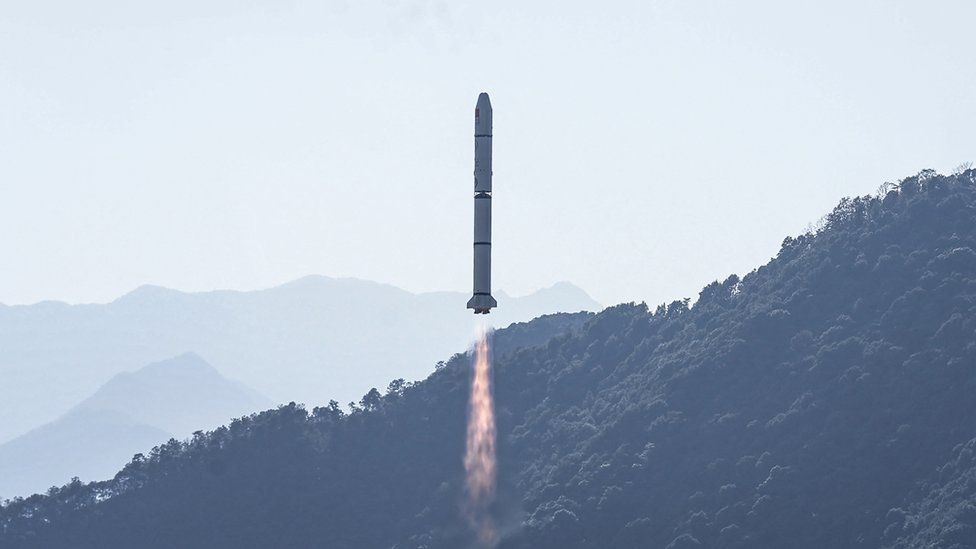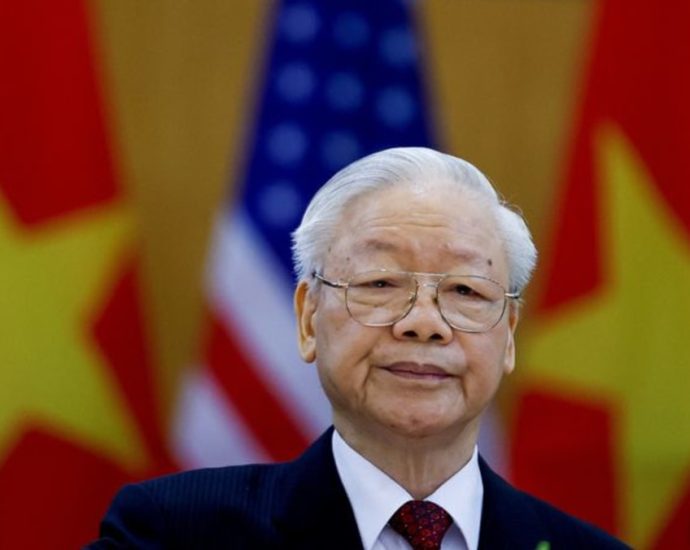Key decisions loom for new Constitutional Court head
PUBLISHED : 12 Jan 2024 at 04:00
Nakharin Mektrairat has been named the Constitutional Court president to succeed Worawit Kangsasitiam, who vacated the post on Sept 9 last year.

Nakharin: Ruled on Prayut’s tenure
Mr Nakharin was selected among nine judges with five votes. Jiraniti Hawanont and Panya Udchachon received two votes each.
Appointed under the 2007 constitution, Mr Nakharin has been a Constitutional Court judge since November 2015. His nine-year term will end in November but could be extended.
Before being appointed a Constitutional Court judge, he was a lecturer at Thammasat University’s political science faculty, serving part of that as faculty dean from February 2004 to January 2010. He also took part in the charter writing process during 2006-2007 and 2014-2015.
The 66-year-old is a political science graduate from Thammasat University with a master’s degree in history from Chulalongkorn University and a doctorate in international studies from Japan’s Waseda University.
He was one of the three minority judges who ruled that former prime minister Prayut Chan-o-cha’s eight-year tenure ended on Aug 24, 2022.
He was among the majority of judges who accepted a petition involving former Move Forward Party (MFP) leader Pita Limjaroenrat’s MP status, resulting in Mr Pita being suspended from his MP duties.
The selection of the new president comes ahead of three key cases to be ruled this month.
On Jan 17, the court is scheduled to issue a ruling in a case against Bhumjaithai Party secretary-general Saksayam Chidchob, who stands accused of concealing assets and using a nominee to hide ownership of a company which won government construction projects.
On Jan 24, the court is set to rule on the fate of Mr Pita, now the advisory chairman of the main opposition party, who is accused of violating a media share-holding rule concerning his running in last year’s general election.
On Jan 31, the court will rule whether the MFP’s policy on Section 112 of the Criminal Code, better known as the lese majeste law, was an attempt to overthrow the constitutional monarchy.
On Wednesday, the court issued an announcement to ensure public order for those three dates, saying only the individuals directly involved in the cases or authorised individuals are allowed in the courtroom to hear the rulings.
Chinese NY fest all set for Sunday
PUBLISHED : 12 Jan 2024 at 04:00
NEWSPAPER SECTION: News

A collaborative concert featuring top musicians from Thailand and China is set to take place this Sunday at Prince Mahidol Hall, Mahidol University, in celebration of the Chinese New Year festival in 2024.
“Sound of Celebration: Collaboration Concert for Happy Chinese New Year 2024” is being organised through a partnership between the Chinese Embassy in Thailand and the College of Music at Mahidol University.
The event will feature a collaborative performance by the Jade Guzheng Ensemble from Zhejiang Conservatory of Music, the Thailand Philharmonic Orchestra, and the Mahidol Symphony Orchestra of the College of Music at Mahidol University.
The concert will be presided over by Culture Minister Sermsak Pongpanit, inaugurated by Chinese Ambassador Han Zhiqiang, and attended by Khunying Patama Leeswadtrakul, chair of the Thailand Philharmonic Orchestra.
“This is not the first time that the College of Music at Mahidol University and the Thailand Philharmonic Orchestra have jointly organised celebratory events with musicians from China to strengthen cultural and musical friendships despite the recent challenges posed by the Covid-19 pandemic,” Khunying Patama said.
“However, this occasion is considered the largest collaboration, featuring diverse forms of collaboration, especially with the Jade Guzheng Ensemble from China. It represents a significant cultural exchange through the use of similar musical instruments for a joint performance,” said Khunying Patama.
Almost 300 kids missing in 2023

PUBLISHED : 12 Jan 2024 at 04:00
Close to 300 children were reported missing last year, a 17% increase on the previous year and the highest number recorded in the past five years, according to the Mirror Foundation, a non-governmental organisation dedicated to helping find missing people.
Ekaluk Loomchomkae, head of the foundation’s missing persons information centre, said that 296 children were reported missing and that up to 58%, or 172, ran away from home due to various factors, including rows over game addiction and other family problems.
Another 19% of cases were associated with intellectual disabilities, while five children were abducted by sexual predators, said Mr Ekaluk.
Children aged between 11 to 15 years old proved to be the most vulnerable, given the fact that up to 138 individuals reported missing in 2023 were in this age range. Children in this age group also had a high tendency to run away from their families to stay with friends or with someone they met online.
And because they are too young to defend themselves, these runaways often ended up being sexually abused or used as child labour, he said.
The report also highlighted 62 cases of missing children under the age of 10 and another 96 involving teens aged 16-18.
One of last year’s child abduction cases was revealed by the Metropolitan Police Bureau. An eight-year-old boy was abducted by a man who offered him sweets to go with him and then forced him to work as a beggar on the streets. The boy was later rescued, and his abductor was arrested. The man was found to have had a previous conviction for the same offence.
School official in Tak faces sack after sexual abuse probe

PUBLISHED : 12 Jan 2024 at 04:00
The Office of the Basic Education Commission (Obec) yesterday said a 43-year-old deputy school director in the northern province of Tak is facing the sack after an investigation found there were grounds to claims he molested a number of female students and sent inappropriate messages.
The deputy, whose name was withheld, had been transferred to Obec’s headquarters pending the preliminary fact-finding investigation that began on Jan 5.
On Sunday, the school’s director, whose name was also withheld, was also transferred to Obec’s office to ensure the investigation would be free and fair.
According to a source, the director had allegedly suppressed and ignored complaints made by students against the deputy.
News about the investigation came after a post calling for legal help for the victims was posted on the Red Skull Facebook on Jan 5.
It said the victims were Matthayom 2 to Matthayom 6 students at the Rat Prachanukhro 55 School in the border province.
The post claimed that the deputy director had been harassing girls for years.
The girls were called to the deputy director’s house to work on a project but would instead be sexually assaulted, it said.
Some of the victims said the deputy director had also sent them pictures of his genitalia, it said.
At least 15 students have had to leave the school since last year due to the allegations, it added.
On Wednesday, copies of explicit messages allegedly sent by the deputy director were posted on the Red Skull Facebook page.
Most of the students at the school were Hmong or Karen people who left their homes in remote villages to study, it said.
Kesthip Supawanich, Obec deputy secretary-general, said a serious disciplinary probe will conclude when possible. The teacher is expected to face the sack, she said.
Other personnel who contributed to the wrongdoing, either by concealing crimes or neglecting children, will face punishment, she said.
“The safety of the students is of the utmost importance,” the Obec spokesperson said.
Beijing reminds Taiwanese to pick the right leaders
Political tensions in the Taiwan Strait have risen recently as about 20 million Taiwanese voters prepare to elect their president and lawmakers on Saturday.
China’s Taiwan Affairs Office’s spokesperson Chen Binhua said Taiwanese people should not vote for Democratic Progressive Party (DPP)’s presidential candidate Lai Ching-te, because Lai’s “Taiwan independence” approach is dangerous and will only push the island towards war and recession.
“Cross-strait relations have deteriorated from peaceful development to tense confrontation over the past eight years,” Chen said in a media briefing on Wednesday. “The so-called ‘Tsai Ing-wen path’ is a path of ‘Taiwan independence’ and confrontation, and is harmful to Taiwan.”
He said “Taiwan independence” is the major threat to Taiwan’s security, the interests of Taiwanese people and regional stability.
Chen’s strong words came after Lai said at a press conference on Tuesday that he would continue Taiwanese President Tsai Ing-wen’s diplomatic, national defense and cross-strait policies. Lai also said he would help create a new situation in the Indo-Pacific region and push forward cross-strait exchanges and cooperation.
Lai said Taiwan’s door is always open for cross-strt cooperation based on the principle of reciprocity and dignity.
Lai’s advantage
Western media have described the coming Taiwanese elections as one of the most important political events in 2024 as the results could affect the stability of the Taiwan Strait, Sino-United States relations and the global chip supply chain.
According to the numbers released by media and research institutions on January 2, DPP’s Lai was leading in the final pre-election polls by 3-5 percentage points over the Kuomintang’s candidate, New Taipei Mayor Hou Yu-ih.
For example, a survey conducted by the United Daily News showed that Lai had a rating of 32% while Hou had 27%. The Taiwan People’s Party (TPP) candidate Ko Wen-je’s rating was about 21%.
However, Lai’s advantage seemed to be shrinking as Ko’s popularity among younger voters was rising due to his strong social media campaigns, Taiwanese commentators said.

They said some young DPP supporters may turn to vote for Ko as they were fed up with the cross-Strait political disputes and wanted their leaders to focus on improving people’s livelihood. If this is the case, KMT may still win the elections assuming Hou can gain trust from older voters.
On Tuesday, an open letter purporting to be from former independent candidate Terry Gou and endorsing Hou began circulating on the Internet. The letter has Guo calling on his supporters to vote for the KMT in order to stop the DPP from renewing its term.
Guo’s office said the billionaire did not write the letter. United Microelectronics Corp (UMC) honorary deputy chairman John Hsuan told the media that some friends had written the letter representing Gou’s views. Hsuan said Gou might not have read this letter but probably would not deny its content.
‘Trust Xi Jinping’
Meanwhile, former Taiwanese President Ma Ying-jeou also wanted to help Hou win but his recent comments have drawn controversy.
In an interview with Germany’s DW published on Wednesday, Ma says Lai is a long-term “Taiwan independence” promoter. He says Lai’s approach will only lead to a war in the Taiwan Strait while the US will avoid joining it as such a move would trigger a nuclear war.
Ma says the best approach is to communicate and cooperate with China as Taiwan can never win a war against China. He says that, in cross-strait relations, Taiwan must trust Chinese President Xi Jinping, who he insists has no plan to invade the island. He also says Taiwan should avoid boosting its defense expenses as that would provoke China.
Hou said Thursday that he has different views from Ma. He said he would not have unrealistic hopes about cross-strait relations. He said he will push forward his 3D strategy, which refers to deterrence, dialogue and de-escalation, meaning that he will not cut defense expenses but will continue to maintain dialogue with Beijing.
UMC founder Robert Tsao Hsing-cheng said Ma represents a small group of hypocritical Taiwanese business people, who support Beijing’s suppression of Taiwan. Tsao warned that if the KMT controls the government, it will gradually make Taiwan a replica of Hong Kong, which is now fully controlled by Beijing.
Tsao also suspected that Ko’s “unlimited resources” in online campaigns might come from Beijing. But he did not provide any evidence.
Balloons and satellite
Tensions in the Taiwan Strait had been growing over the past month as dozens of high-altitude balloons, launched by China, had been seen flying over and around Taiwan.
On January 7, three Chinese balloons flew over the median line in the Taiwan Strait; one of them crossed Taiwan at its southernmost tip.
Taiwan’s Ministry of Defense said the launch of mysterious balloons flying across the Taiwan Strait represents China’s “gray zone” harassment against the island.
On Tuesday, the ministry sent a bilingual emergency alert to residents’ mobile phones, telling them that a satellite had flown over Taiwan. However, it mistranslated “rocket” into “missile” in the English version of the alert, which shocked many Taiwanese people.
The ministry on Wednesday apologized for the mistranslation but insisted that the issuance of the alert had been necessary. President Tsai urged the public not to worry, ruling out the possibility that the launch of China’s satellite had been a political move.

Ling Tao, a spokesperson for the Kuomintang’s election campaign, on Wednesday said the Defense Ministry was being used by the ruling DPP as a tool to manipulate the coming elections.
He said the ministry had not issued any alert even though the People’s Liberation Army held large-scale military drills near Taiwan when then-US House Speaker Nancy Pelosi visited the island in August 2022. He questioned whether the DPP was using the Chinese Communist Party to intimidate Taiwanese people.
Read: Ruling DPP can still lose Taiwan’s presidency
Follow Jeff Pao on Twitter at @jeffpao3
Uni students win big at Hong Leong Bankâs generative AI hackathon
‘Can You Hack It’ saw solutions to improve customer & workplace experience
Alignment with HLB brand values which strongly promote a culture of innovation
Hong Leong Bank (HLB) organized Malaysia’s first Generative AI-themed hackathon in Dec, with its sixth annual ‘HLB Can You Hack It’ hackathon. With 90 teams of students, fresh graduates,…Continue Reading
Taiwan election: China warns voters then condemns US ‘brazen chattering’
 Reuters
ReutersChina has warned voters in Taiwan to make the “right choice”, two days before presidential elections on the self-ruled island which Beijing claims.
A win for the ruling party candidate William Lai would pose a danger to relations, China said.
It also criticised “brazen chattering” by the US after Washington warned Beijing not to stoke tensions ahead of Saturday’s vote.
Who wins the poll could push the island further towards, or away from, Beijing.
Taiwan is a key flashpoint in the tussle between China and the US for supremacy in Asia.
China’s Taiwan Affairs office said Mr Lai would further promote separatist activities if he were elected.
“[He] would continue to follow the evil path of provoking ‘independence’ and… take Taiwan ever further away from peace and prosperity, and ever closer to war and decline,” it said in a statement.
Mr Lai, of the Democratic Progressive Party (DPP), has called for voters to “choose the right path” to maintain Taiwan’s sovereignty. His main opponent, Hou Yu-ih of the Kuomintang (KMT), has called Mr Lai a danger to relations with China.
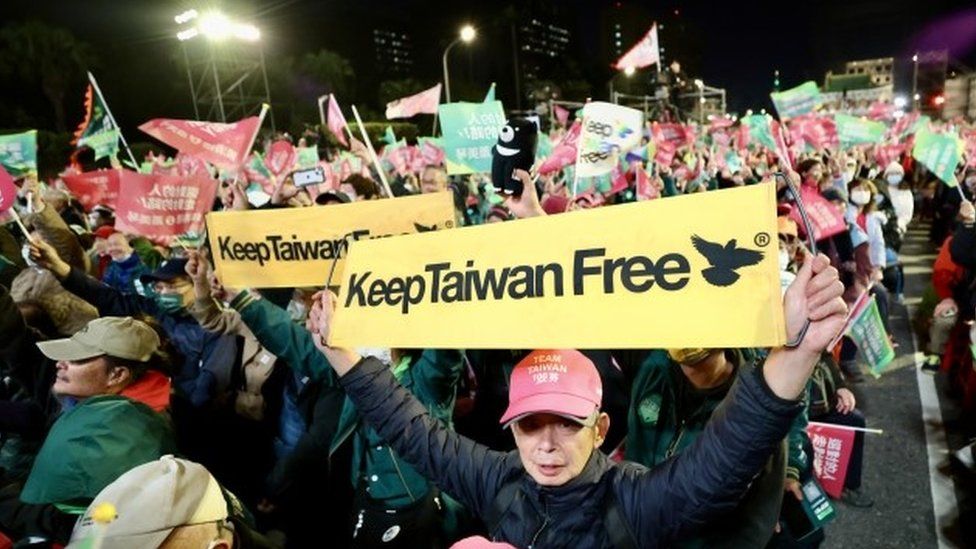
Many Taiwanese consider themselves to be part of a separate nation – although most are in favour of maintaining the status quo where Taiwan neither declares independence from China nor unites with it.
The island sees itself as distinct from the mainland – but China’s government says it is a breakaway province that will, eventually, be part of the country, and has not ruled out the use of force to achieve this.
Mr Lai had been narrowly in front in the presidential race before polling stopped on 2 January. Parliamentary elections are also being held.
China’s message to voters came as it told the US to stop commenting on the election.
The foreign ministry in Beijing issued a sharp rebuke to Washington after the US said it would send an unofficial delegation to Taiwan after the vote.
The US government must “refrain from intervening in the elections… so as to avoid causing serious damage to US-China relations”, a spokesperson said.
China “expresses… resolute opposition to the American side’s brazen chattering about the elections in the Taiwan region”.
Beijing has said Taiwan’s voters face a choice between peace and war in the elections.
On Thursday’s Taiwan’s Foreign Minister Joseph Wu criticised China for its “repeated interference” in Saturday’s vote.
“Frankly, Beijing should stop messing with other countries’ elections & hold their own,” Mr Wu posted on X, the social platform formerly known as Twitter.
-
-
2 days ago
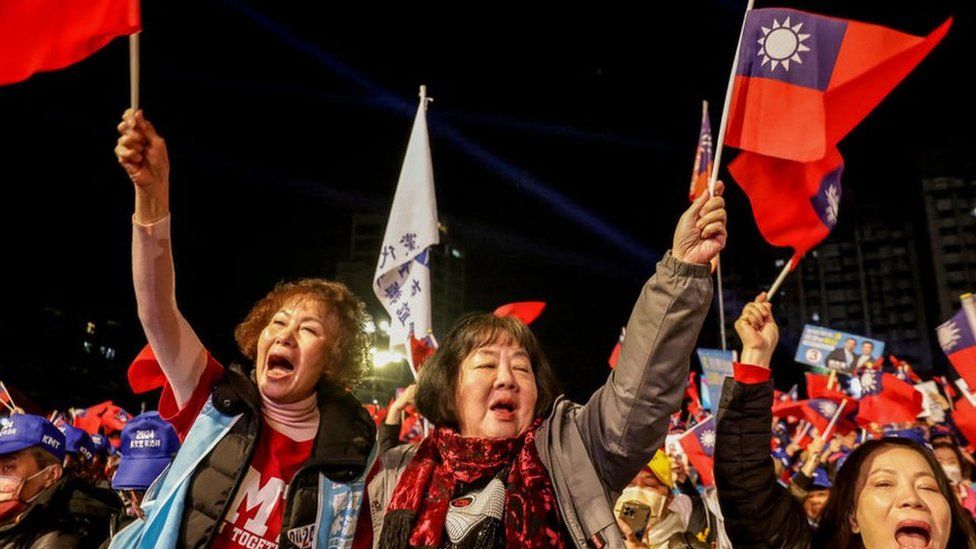
-
-
-
3 days ago
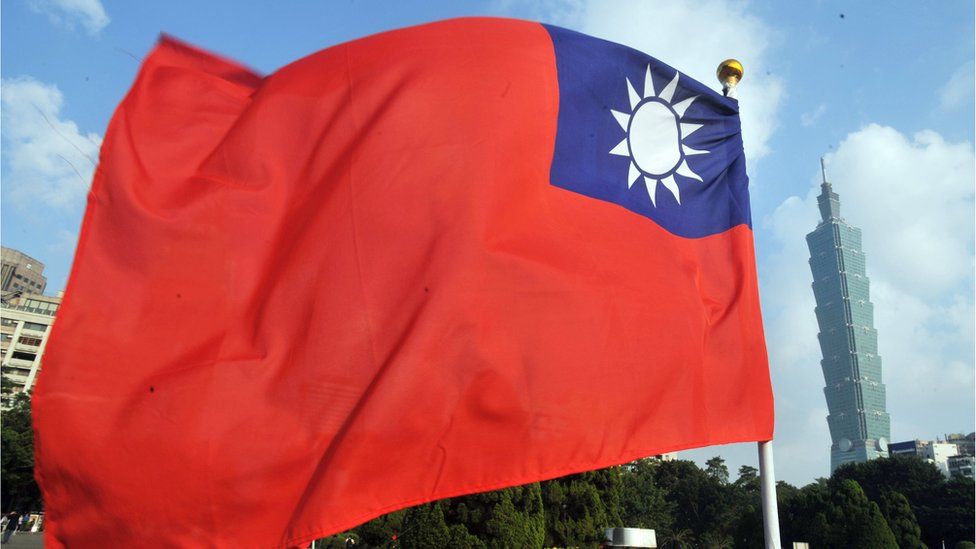
-
-
-
6 October 2021
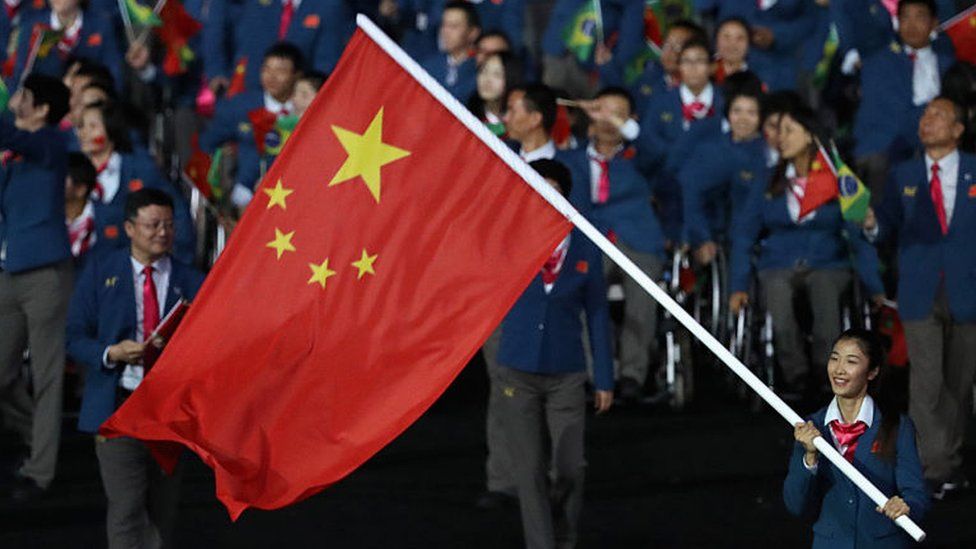
-
Vietnam’s top leader misses meetings amid health concerns
The head of Vietnam’s Communist Party Nguyen Phu Trong is expected to miss on Friday (Jan 12) the second state visit of a foreign leader to Hanoi in less than a week amid concerns about his health. Trong, 79, who has been at the helm of the party since 2011,Continue Reading
Germany’s Scholz slams ‘fanatics’ after far-right deportation row
BERLIN: German Chancellor Olaf Scholz urged democrats to stand against far-right “fanatics” after reports emerged of Alternative for Germany party members attending a meeting where expelling citizens with foreign ethnic backgrounds was discussed. The AfD did not deny that two of its senior politicians attended the November meeting in aContinue Reading
Former ministers face bribery charges over labour exports
DSI says total of B36 million paid out to secure work in Finland for Thai berry pickers
PUBLISHED : 11 Jan 2024 at 18:14
UPDATED : 11 Jan 2024 at 18:35

The Department of Special Investigation (DSI) says it will file charges against two former ministers and two high-level officials at the Ministry of Labour for allegedly demanding 36 million baht in exchange for approving the export of Thai workers to Finland.
The DSI said on Thursday that it has evidence to back the bribery allegations against the four individuals, with some of the evidence coming from authorities in Finland.
The statement did not name the politicians or officials.
According to the DSI, a group of politicians, civil servants and civilians demanded that a Thai job broker pay an average of 3,000 baht for each worker destined to work harvesting wild berries in the Scandinavian country.
The broker in turn passed the special requirement on to about 12,000 Thai workers exported from 2020 to 2023. They had to pay altogether about 36 million baht in addition to other expenses.
The DSI said that both it and public prosecutors had agreed to press the charges with the National Anti-Corruption Commission (NACC).
From 2020 to 2023 the labour minister was Suchart Chomklin, now a list MP and deputy leader of United Thai Nation, one of the parties in the governing coalition.
The veteran Chon Buri politician said on Thursday that he was innocent and would defend himself in the justice system.
“I did nothing wrong and I have no worries,” he said. “I have never been summoned for questioning and neither have any government officials.”

Suchart Chomklin, who served as labour minister from 2020-23, chats with Thai workers during a visit to a berry picking site in Finland in 2022. He has denied any involvement in the bribery alleged by the DSI. (Photo: Ministry of Labour)


